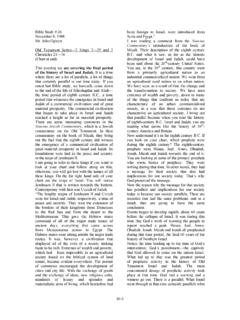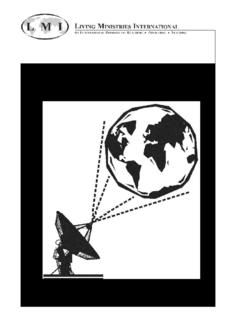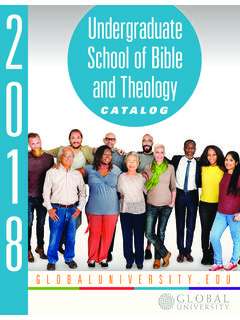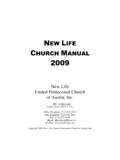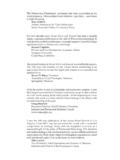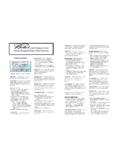Transcription of are getting into the book of 1 Corinthians this evening ...
1 61-1 bible study # 61 December 11, 1990 Mr. John Ogwyn Life and Letters of Paul Series 1 Corinthians We are getting into the book of 1 Corinthians this evening . I would like to comment by way of background on 1 Corinthians , particularly the background of the city of Corinth. Corinth was a city in Greece. It was, really, the commercial capital of Greece. It was a major port and it had all the major problems of ports. In some ways, it was the New Orleans of its day, perhaps in more ways than one. Corinth, at the time of the Apostle Paul, had a population of about 400,000, just a little bit smaller than the city of New Orleans. It was a very major world city in that day. There were only three cities that had a larger population than Corinth at the time of Paul: the cities of Rome (Italy), Alexander (Egypt) and Antioch (Syria). The population was mainly Greek, but there were others there because Corinth was a very cosmopolitan city.
2 As a result of being a very busy seaport, the wealth and the life of Corinth were really proverbial in the ancient world. The temple of Aphrodite, the patron deity, sat on a large hill that overlooked the city of Corinth. Aphrodite was the Greek name for the one that the Romans called Venus, the goddess of love, or perhaps more accurately, the goddess of lust because that s what Aphrodite amounted to. The worship of Aphrodite involved temple prostitution. There were sacred prostitutes who served there in the temple. It was a climate of immorality that, in some ways, even surpassed most places today. I don t know that it would surpass San Francisco, but it would certainly run them a good race. I think the cities we have today that are proverbial for their vice and immorality really don t have a whole lot on Corinth. Corinth was quite noted for that kind of thing.
3 The city of Delphi was located a few miles north of Corinth. this is where the famous Delphic Oracle, the priestess of Apollo, resided. The Delphic Oracle was quite famous throughout the ancient world. People from various areas would make pilgrimages to Delphi to ask a question of the god Apollo. The priests there had quite a show that they put on. They would begin to dance around, hoop and holler, work themselves up into this , as the historians or commentaries term it, ecstatic frenzy. It was kind of like a Pentecostal church; that is about what it amounted to. They would hoop it up until this Delphic Oracle, a woman, would finally get so wild eyed and worked into such a state of frenzy that she would fall over and begin to babble incoherently. At that time, it was felt that she was speaking in the language of the gods. Speaking in, as the Greeks termed it, an unknown tongue the tongue of the gods.
4 The priests would dutifully take this down and then claim to interpret what she said. Basically, they would say whatever they wanted to say and claim that this was the interpretation of what she had said. They were quite noted for coming up with some enigmatic interpretations. One of the most famous was back several centuries prior to the time of the Apostle Paul. A king who was contemplating an attack on the Persian Empire traveled there to the Delphic Oracle. He was told by the priest who claimed to interpret what the oracle had said, If you attack Persia, a great empire will be destroyed. He assumed that meant he would win. In reality, he lost. They said, That s what we said. We didn t tell you which empire. They were kind of noted for playing both ends against the middle on their prophecies. You could take it a variety of different ways. People are affected, shaped and influenced by their background and by the things that are around them.
5 The people in the Corinthian Church grew up in a city that was noted for its wealth and luxury. It was a commercial center. There was a lot of trading and a lot of ships that came and went. Since it was a major port, the people were materialistic; they tended to think in material terms. It was a comparatively wealthy area. They were influenced by the very casual attitude toward immorality. Immorality was taken very lightly. Many had grown up in a religious background where immorality was even utilized in that context. They were influenced religiously. We are going to notice the impact of the surrounding area, even the impact of the Oracle of Delphi a short distance away. One of the things important to understand is that the word for tongues in the New Testament is very plain. When you go to Acts 2, the miraculous gift of the Holy Spirit was the gift of speaking in foreign languages.
6 The individuals in Jerusalem from other countries were able to understand in their own language. Glossolalia in the Greek is translated tongues and means almost exactly what our English word tongues means. In the Greek language there are three different connotations. It was used in three 61-2different ways: (1) the physical organ in the mouth. James 3:5 says your tongue is a little member but boasts great things. (2) It refers to foreign languages. Acts 2 clearly refers to people hearing the sermon in their own language. We sometimes refer to my native tongue, using tongue to refer to a foreign language. (3) It is also used by the Greeks to refer to the so-called ecstatic speech of the Delphic Oracle. There were other lesser oracles, but realize that ecstatic speech (speaking in tongues) played a role in pagan Greek religion. There were aspects of pagan Greek religion that would have not been dissimilar to a lot of Pentecostal meetings.
7 That s not commonly recognized, but it was, nevertheless, the case that existed. When you hear a word, you understand and interpret that word on the basis of the way you have heard it used. What it means to you is not necessarily what it means to the person who said it. That s one of the reasons that people have a lot of problems sometimes in reading the bible . We have grown up with certain false religious teachings and we tend to read those into the bible . We have things to unlearn. Many of the so-called difficult scriptures that people come up with are only difficult because we have a preconceived idea of what it means. It doesn t square with the truth, but the verse seems to say that. Yet, if someone just looked at it objectively, it wouldn t say that at all. But it says it to us because we have had a background of where that has been, perhaps, misused or misapplied. this colored some of the problems that existed in Corinth.
8 We are going to see that the latter part of the book of 1 Corinthians deals with the subject of tongues. In reality, there are several chapters. Chapter 14 specifically deals with the subject, but chapters 12 and 13 lay the basis for what Paul is going to say in chapter 14. Paul wrote the book of 1 Corinthians . He came to Corinth on his second evangelistic journey in the fall of 50 We went through that last time. Paul, after the ministerial conference of 49 , returned to Antioch. Then, leaving in the spring of 50 , he traveled across Asia Minor, and finally entered into Greece (Europe) on Pentecost of 50 He came from Philippi, up in northern Greece (Macedonia), down through Thessalonica, Berea, down a little further to Athens, and finally wound up in Corinth. He stayed there 18 months. It was from there that he wrote 1 and 2 Thessalonians. Then he left just in time to return to Jerusalem for the Feast of Tabernacles in 52 (Acts 18:21).
9 In Acts 19, we find that Paul came to the area of Ephesus on his third evangelistic journey. If you have a map, you might check. Ephesus is right on the coast of modern-day Turkey, right on the edge of Asia Minor, just across the water from Corinth. It is a little over 100 miles away by water. Ephesus was a major port. There were ships that went back every day. Roman cargo ships carrying mail made that journey, leaving Ephesus several times a day. Paul came back to Ephesus on his third journey and he stayed there in Ephesus quite a while. It was toward the end of his stay in Ephesus that he wrote 1 Corinthians , which would be dated to the Days of Unleavened Bread 55 I will show you why we would date it to the Feast of Unleavened Bread of that year. The thing that we immediately see in the book of 1 Corinthians is that it was written in response to problems. 1 Corinthians 1:11, For it has been declared to me concerning you, my brethren, by those of Chloe s household, that there are contentions among you.
10 You can imagine this went over really well. Chloe was evidently a wealthy lady who lived in Corinth, and there was a congregation that evidently met in her home. There were perhaps two or three similar home congregations that met in the greater Corinth area. They perhaps all assembled together only on Holy Days and special occasions. this was probably one of the things that created a situation where there was more divisiveness. There did not seem to have been a resident local pastor in Corinth at that time that had the oversight of the whole city. Problems existed. Someone from the house of Chloe had been dispatched over to Paul with some news. They had evidently caught a Roman cargo ship out of Corinth to Ephesus. The trip would have taken a couple of days. They came to Ephesus and told Paul some things that were going on. Paul, in turn, wrote this letter. He starts off by saying, I ve heard some news and I m not really happy about what I ve heard.

